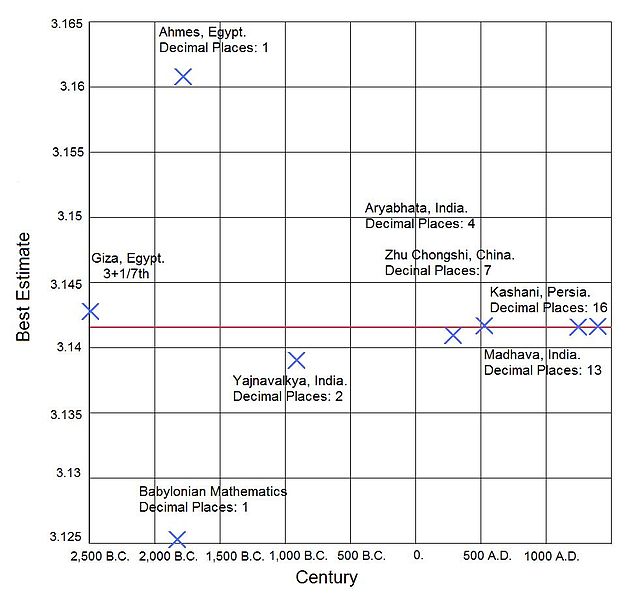Physicist: For essentially every imaginable purpose, knowing that π ≈ 3.14159 is more than good enough. After all, every additional digit you have yields ten times the accuracy. So if you know π out to twenty digits, that’s not 20 times more accurate than just “3”, that’s 100,000,000,000,000,000,000 times more accurate. Every major civilization has been aware of π and have relied on various approximate values. Basically they’d find an approximation that was “good enough” to find the length around any circle given the length across it (the definition of π) and go with that. For example, in parts of ancient India they used π ≈ 62832/20000 (5 digit accuracy), for a while in ancient Egypt they used π ≈ 22/7 (3 digits), and π = 3.2 (1 digit) was nearly used in Indiana embarrassingly recently.
When you’re figuring out how much rope is needed to wrap around a barrel (or whatever they needed π for a few thousand years ago), knowing it out to 10 digits or more is massive over-kill. With only 32 digits of π (3.14159265358979323846264338327950), and a really good measurement of the diameter of the Milky Way galaxy, you could wrap a rope around the galaxy’s circumference that’s accurate to one atom in length. That’s too accurate.
So how do we know that π is irrational? And why does that matter? It wasn’t until 1761 that π was proven to be irrational, so those previous civilizations can be forgiven for not knowing that any attempt to explicitly write π will fail (when written, π meanders on forever without any particular pattern, so no attempt to explicitly write it will ever work). There are several proofs of π’s irrationality but they’re all fairly meandering and complicated (even for this website), although if you’re comfortable with calculus, running through them is a good exercise. In practice (when building physical things) it couldn’t matter less that π is irrational. However mathematicians get very excited about these sorts of problems. In fact, it can be shown (without too much effort) that , and because of this a relationship between the infinitude of primes, and the complicated nature of π can be shown (that is, if there were a finite number of primes, then π would be a rational number). More recently it was shown that π cannot be the solution of any polynomial (with rational-numbered coefficients), and there’s been a lot of work on whether or not any random sequence of numbers shows up somewhere in π (if you’re willing to look long enough).
To date, what with computers and clever mathematicians, π has been calculated out to several trillion digits (based entirely on its extremely simple definition, and buckets of math). The summation series above is one of the easiest to remember, but it’s very slow. There are others that approach π much, much faster and can be found here (and are responsible for our ability to calculate π with such stupefying accuracy). But ultimately there are two reasons to know π out to more than a handful of digits: studying π for purely mathematical pursuits, and winning competitions.
The webcomic is from here.
Answer gravy: π = 3.14159265358979323846264338327950288419716939937510582097494459230781
6406286208998628034825342117067982148086513282306647093844609550582231
7253594081284811174502841027019385211055596446229489549303819644288109
7566593344612847564823378678316527120190914564856692346034861045432664
8213393607260249141273724587006606315588174881520920962829254091715364
3678925903600113305305488204665213841469519415116094330572703657595919
5309218611738193261179310511854807446237996274956735188575272489122793
8183011949129833673362440656643086021394946395224737190702179860943702
7705392171762931767523846748184676694051320005681271452635608277857713
4275778960917363717872146844090122495343014654958537105079227968925892
354201995611212902196086403441815981362977477130996051870721134999999… and so on.
Update: Actually, the proof that pi is irrational isn’t quite too meandering and complicated. One of the simplest is now a post!









How accurate are we with the billions of digits we know?
Exactly accurate.
Is it bad that I have it memorized to 50 places?
How many digits of pi do you need to know to be accurate to the Planck length for the circumference of the visible universe?
Matt’s question…. I like it. I also would like to know the answer.
@ Matt, Joseph
If somehow you had access to the exact diameter of the visible universe (~93 billion light years) you would need about 60 digits of pi to describe the circumference of the visible universe to within 1 Planck length.
This isn’t useful in itself, but it does show that 60 is a somewhat-useful upper bound on how many digits a non-mathematician might need.
Is pi irrational only because we use a base-10 numbering system? Or would pi be irrational in every numbering system besides “base-pi”?
Brandon, good question!
I always suspected that 9 is a prime number 😀
@brandon π is irrational. Period. Here’s π in some different bases:
Base 2
11.00100100001111…
Base 3
10.01021101222201…
Base 4
3.02100333122220…
Base 5
3.03232214303343…
Base 6
3.05033005141512…
Base 7
3.06636514320361…
Base 8
3.11037552421026…
Base 9
3.12418812407442…
Base 10
3.14159265358979…
Base 11
3.16150702865A48…
Base 12
3.184809493B9186…
Base 13
3.1AC1049052A2C7…
Base 14
3.1DA75CDA813752…
Base 15
3.21CD1DC46C2B7A…
Base 16
3.243F6A8885A300…
As you can see, none of these terminate. That’s one of the definitions of an irrational number: along with being unable to express it as a finite fraction, they almost always have “semi-random” (but 100% predictable!) digits that never end, ever.
Pingback: 2 Things I've Been Thinking About | East Edit
Why pi need more accurate when for bigger objects?